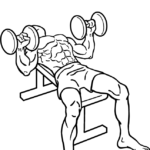We know that throwing up during exercise is very unpleasant, but we also know that we like to push ourselves to the limit and sometimes it seems inevitable.
When we vomit while exercising, it means that we have pushed the body beyond its limits. Vomiting is an instinctive reaction of the body that acts as a kind of defense mechanism.

Vomiting does not have to occur from exercising on a full stomach, since on certain occasions of maximum effort, we can vomit without having eaten anything from all the effort we have made.
When we vomit we have two news, one good and one bad. The good news is that we have done a good training, done with a good intensity and a lot of effort. The bad news is that by exceeding the limits of our body too much, it is not entirely good for achieving a correct progression in the sport.
Also, honestly, nobody likes the feeling of throwing up, since it is one of the most unpleasant things that exist and for that reason, we are going to try to avoid it as much as we can.
The bad thing is that when we are training very hard, sometimes we cannot avoid vomiting or we do not know how to stop doing it. As I have already said, they are involuntary stimuli that we cannot avoid whenever we want.
Luckily there are ways to keep training hard and avoid throwing up, which will make progress while feeling good while letting the body rest properly, as well as the body’s central nervous system and digestive system.
If you want to learn how to avoid vomiting while you are training, you are in the right place, I am going to teach you step by step how to avoid vomiting when exercising. Pay close attention from now on.
Instructions to avoid vomiting when exercising
- Train on an empty stomach:
This seems like something that is obvious, but from time to time it is good to remember it because we tend to forget it. You should never train on a full stomach. especially if the exercise you do is of high intensity, since the body is not ready to exercise when the body is digesting. Normally we must wait a minimum of 2 hours after eating to digest, since this is the time it takes to complete digestion. This time should be lengthened when it is done in cases of very heavy digestion, very copious meals, lengthening it from 3 to 5 hours depending on how we feel. In this way, we will be able to train lighter. Don’t worry about energy, since the human body regulates itself better than you think and doesn’t need as much food. - Get enough rest:
The second thing you should do to avoid vomiting while exercising is to give yourself enough rest. Lack of rest is very common when doing high-intensity interval training, as many people do not rest as long as they need. For example, if we run 10 series of 100 meters with a rest of only 30 seconds, we will surely vomit unless we are an elite athlete. The rest to take will depend on the level that we have in a certain exercise and the type of exercise in question, as well as the intensity at which we perform the exercise (sprinting is not the same as jogging). Also, even if you don’t believe it, resting helps the following series to be more effective, since we don’t run out of steam. - Avoid overtraining:
We define overtraining as anything that involves training more than a natural person (who does not use doping substances) should train. An example of overtraining would be lifting weights too many sets, doing too many exercises, and not getting enough sleep. Muscle develops during rest and needs to rest. In certain cases, we will even vomit, since the body will be so tired in the long run that it will eventually respond by vomiting. Try to get enough rest, which will depend on the type of exercises it is. Normally exercises with weights need more rest than cardiovascular exercises, since the rule that the higher the intensity, the more rest we should do really works.
Tips to avoid vomiting when exercising
- That you don’t vomit doesn’t mean that we are training well:
Even if you manage to avoid vomiting, we may still be training too much, since overtraining does not only cause vomiting. A good example is fatigue, because if we feel excessively tired, we are probably training too much. Also if we notice muscle pain, stagnation in performance in the gym, problems when performing exercises with energy and a bad mood, it may be that we are overtraining. Remember to get enough rest, both on training days and sleeping the right hours, regardless of the sport you do. If you rest enough, believe it or not, in the long term you will improve in sport more than if you do not rest enough, since the muscle regeneration mechanisms, both fibers and glycogen, occur during rest.

















